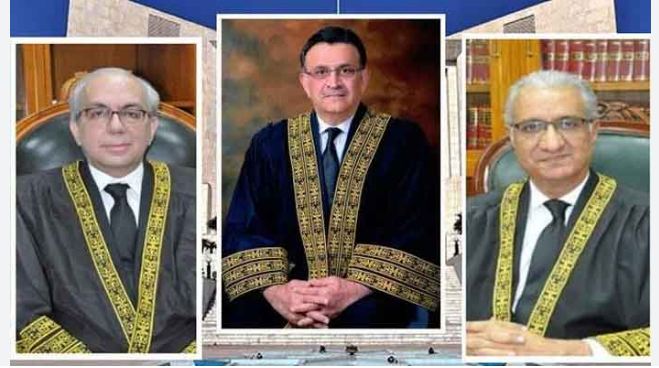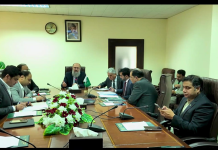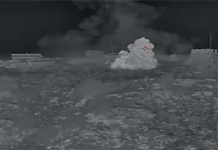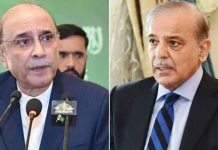ISLAMABAD: The Supreme Court of Pakistan on Monday reserved its verdict in the case pertaining to delay in Punjab and Khyber Pakhtunkhwa by-polls after hearing arguments from Election Commission, PTI and Attorney General Mansoor Usman Awan, ARY News reported.
Ahead of the hearing, the government submitted a statement through Attorney General of Pakistan (AGP) Mansoor Awan, requesting the formation of a full court to hear the case which was ruled out by the three-member bench headed by Chief Justice of Pakistan Umar Atta Bindial.
The PDM government also sought the dismissal of the PTI petition in the light of what it interpreted as a “4-3” order issued by the apex court on March 1.
Unmute
The SC bench has been dissolved twice after Justice Mandukhel and Justice Aminuddin earlier excused themselves from hearing the case.
Notably, the Supreme Court also did not hear the arguments of lawyers representing the political parties that are part of the ruling coalition.
Hearing
The three-member bench headed by Chief Justice of Pakistan (CJP) Umar Ata Bandial and comprising Justice Munib Akhtar and Justice Ijaz ul Ahsan resumed hearing into the election delay case today.
At the outset of the hearing, Chief Justice of Pakistan Justice Umar Ata Bandial asked PPP lawyer Farooq H Naek have you ended the boycott of the bench?
The PPP had objections to the formation of the bench and had not boycotted the proceedings, Naek replied to which the CJP asked, then who has boycotted the three-member bench?
The CJP denied hearing the coalition govt lawyers. During the hearing, Kamran Murtaza in his arguments said they have reservations on the bench.
Pakistan Muslim League-Nawaz (PML-N) lawyer Akram Sheikh told the court that they are yet to take back the power of attorney and they have objections to the bench hearing the case. He also clarified they have not boycotted the proceedings yet.
Justice Munib Akhtar in his remarks said on the one side you people are boycotting the hearing and on the other hand, want to be part of the court proceedings.
The question had been raised on how could the ECP give the date of Oct 8 for polls, the CJP remarked. He said only the apex court had the authority to delay elections as happened in 1988 and the Election Commission of Pakistan had no such power to do so.
CJP Bandial added that the Supreme Court’s hearing is in the public interest and there is a difference of opinion among judges.
AGP Awan then went back to the suo motu case stating that in the “first round,” a nine-member bench heard the case.
“Details of the two judges’ dissenting note have come forward while the two judges had thrown out the pleas on the first day,” stated AGP Awan.
CJP Bandial then told the AGP that he is yet to find a case in which the chief justice was barred from changing the bench.
The attorney general of Pakistan further said the problem is whose decision is the majority one. “The solution is that those judges who heard the case earlier should be separated from it now.”
Your point is noted, moved forward, Justice Munib Akhtar, another member of the bench remarked.
SC Registrar’s Office released a circular after Justice Qazi Faez Isa’s May March 29 verdict. The court order or decision cannot be set aside with a circular, the AGP added.
“Court decision can only be nullified in the review petition.”
To, this CJP Umar Ata Bandial said no decision is nullified through a circular, it was only issued on the matter of barring hearings under Article 184/3, the top judge remarked.
The top judge also remarked that no clear directions were given in the order passed by a three-member bench headed by Justice Qazi Faez.
Justice Munib further remarked if AGP’s stance is accepted by the SC, even then the full court cannot hear this case.
CJP Bandial asked AGP that he can plead for the formation of a larger bench to hear the case but cannot for a full court. “Full court meeting can be fruitful, but not a bench.”
The CJP further remarked that he met senior judges in the last three days. CJP Bandial also remarked harmony among judges was crucial for the Supreme Court. He said judicial proceedings were made public but consultations among judges were considered an internal matter.
The hearing has been adjourned for a while.
‘Security an important issue’
Commenting on the security issue during today’s hearing, the top judge said security is an important issue but the issue of forces is not only of Army, but it is also of Pakistan Navy and Pakistan Air Force.
“Help from Navy and Pakistan Air Force can be sought if Pakistan Army is busy in security issues,” the CJP was quoted as saying.
CJP remarked that an in-chamber hearing will be conducted if any ‘sensitive issue’ comes before the court.
Secretary Defense, Lt. General (retired) Hamoodur Zaman said the security situation in Punjab is ‘concerning’, and cannot reveal details in the open court, as it will help Pakistan’s enemy, he added.
CJP asked who will give security for the elections and added that question is how everything will be ‘good’ on October 8.
The secretary defense said the reserve force can be summoned in an ‘extraordinary’ situation.
Govt cannot boycott court proceedings: AGP
Upon being asked by the CJP, the Attorney General of Pakistan, Mansoor Usman Awan said the government cannot boycott the court proceedings.
Government functions as per law and constitution, he added. In his arguments on the PTI’s plea, the AGP said the plea has pleaded with the SC to nullify the Election Commission of Pakistan’s (ECP) decision to postpone the election.
The PTI plea states to give the right to announce the election date in KP to the president based on the court’s decision of March 1.
However, governor KP did not give any election date until the filing of the PTI plea, he added.
Coalition govt shows no-trust
On Saturday, the coalition parties expressed their “lack of confidence” in the three-member bench of the Supreme Court (SC) of Pakistan hearing a Pakistan Tehreek-e-Insaf (PTI) petition against the delay in elections of the Punjab Assembly.
The decision was taken during a high-level meeting of Pakistan Democratic Movement (PDM) parties, chaired by Prime Minister (PM) Shehbaz Sharif to discuss the “overall political situation of the country”, according to a statement issued by Prime Minister’s Office (PMO).
The coalition parties expressed a lack of confidence in the Supreme Court bench — comprising Chief Justice of Pakistan (CJP) Umar Ata Bandial, Justice Ijazul Ahsan and Justice Muneeb Akhtar.
Security arrangements
Strict security measures have been taken by the Islamabad administration, and police and Rangers personnel have been deployed to maintain law and order during the high-profile case hearing.
Unrelated people including political leaders and lawyers have been barred from entering Red Zone over security concerns.
The lawyers and police officials also exchanged hot words over the denial to entry in the SC.

















